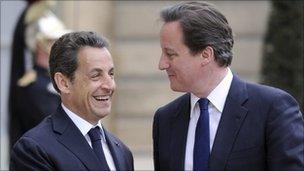Cameron and Sarkozy restate Libya 'determination'
- Published

UK Prime Minister David Cameron and French President Nicolas Sarkozy have restated their determination to enforce the UN resolution on Libya.
Downing Street said the leaders of the UK and France had agreed to intensify the pressure on the regime "militarily, politically and economically".
The call comes after Mr Cameron and Mr Sarkozy spoke on the phone on Friday.
It also comes as the allied military operation to protect civilians in Libya reaches the end of its seventh week.
The UK and France have both provided jets to mount air-strikes on Gaddafi's ground forces and patrol the no-fly zone in Libyan skies.
Downing Street said: "The prime minister spoke to President Sarkozy [on Friday] evening to take stock of the international community's efforts to protect civilians in Libya.
"The prime minister and the president welcomed the outcomes of [Thursday's] Contact Group meeting in Rome.
"They agreed on the priority of continuing to increase the pressure militarily, politically and economically, to isolate the discredited Gaddafi regime and ensure full implementation of UNSCR [Un Security Council Resolution] 1973.
'Wanton disregard'
"The leaders also reiterated that Gaddafi's departure is essential to ensure a stable and peaceful Libya, and to allow the Libyan people to determine their future.
"The International Criminal Court report on the regime's crimes has reinforced this."
Meanwhile, Britons in Tunisia have been advised to stay away from the country's border with Libya, where Col Gaddafi's forces have been continuing to attack rebels opposed to his regime.
Foreign Office minister Alistair Burt condemned the attacks as showing "wanton disregard" for international law.
The Foreign Office has advised against all but essential travel within 40km (25 miles) of the frontier, but popular Tunisian tourist destinations are unaffected.
On Thursday, The Libya Contact group, which includes Nato members, Arab states and international groups, agreed to provide more money for rebel groups.
Earlier that day two more Libyan diplomats were expelled from the UK because of "unacceptable" behaviour.
The Libyan ambassador to the UK was expelled on 1 May after the British embassy in Tripoli was set on fire.